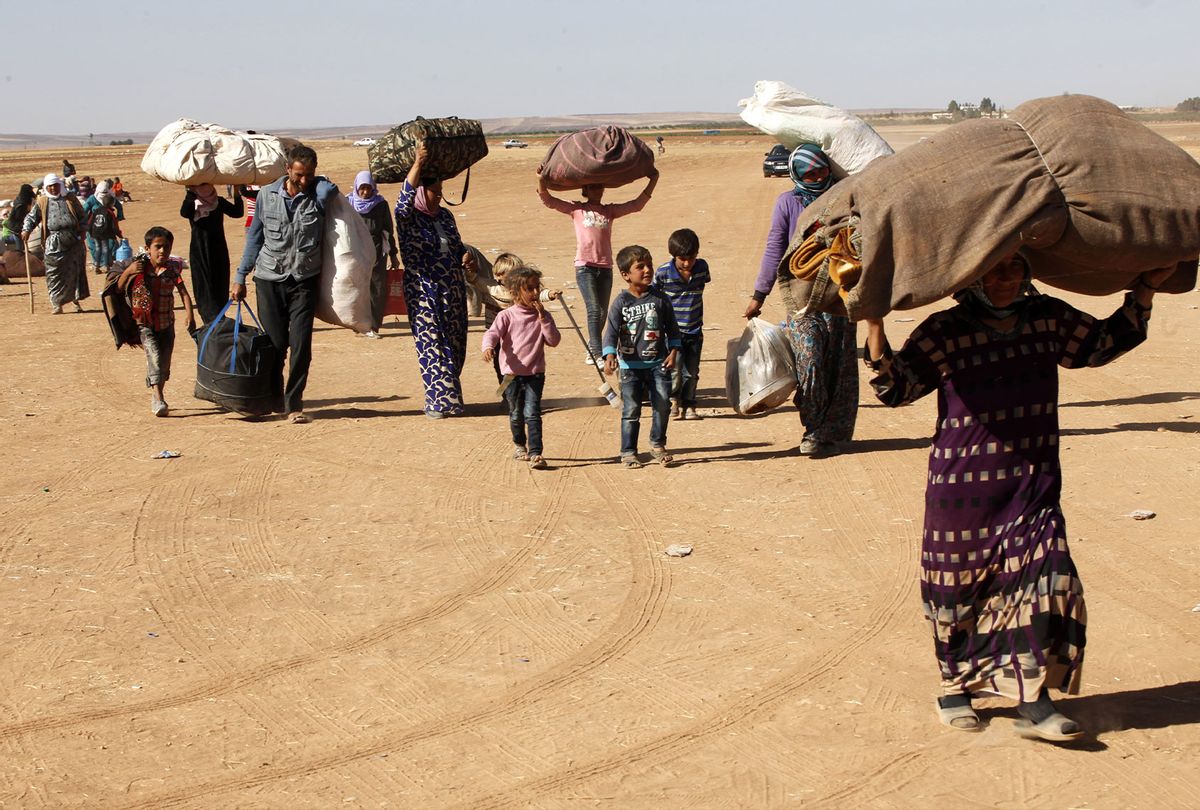A United Nations agency revealed Thursday that a rising number of people worldwide are fleeing violence, insecurity, and the effects of the climate emergency, with over 84 million relocating within and beyond their home countries during the first half of this year.
"It is the communities and countries with the fewest resources that continue to shoulder the greatest burden in protecting and caring for the forcibly displaced."
The new U.N. Refugee Agency, or UNHCR, report—released at the tail end of a global climate summit—says that "durable solutions for forcibly displaced populations remained in short supply due to unresolved and escalating conflicts in many countries of origin, as well as the continuing restrictions on movement in response to Covid-19."
Internally displaced people (IDP) make up more than half of the agency's total tally at 48 million. According to UNHCR, from January to June, there were also 26.6 million refugees—nearly a fifth of whom are Palestinians—as well as 4.4 million asylum-seekers and 3.9 million Venezuelans displaced abroad, which is its own category.
"The international community is failing to prevent violence, persecution, and human rights violations, which continue to drive people from their homes," said Filippo Grandi, the U.N. high commissioner for refugees, in a statement. "In addition, the effects of climate change are exacerbating existing vulnerabilities in many areas hosting the forcibly displaced."
Grandi added that "the international community must redouble its efforts to make peace, and at the same time must ensure resources are available to displaced communities and their hosts."
"It is the communities and countries with the fewest resources that continue to shoulder the greatest burden in protecting and caring for the forcibly displaced," he noted, "and they must be better supported by the rest of the international community."
Along with the overall rise in forcibly displaced people from 82.4 million at the end of 2020, the agency found that:
- Developing countries hosted 85% of refugees and Venezuelans displaced abroad;
- 73% of refugees and displaced Venezuelans lived in neighboring countries;
- Asylum-seekers submitted 555,400 new claims, with the United States receiving the most applications—72,900;
- Turkey hosted the world's largest refugee population at 3.7 million people;
- 16,300 refugees were resettled during the first half of this year;
- 1.1 million people returned to their areas or nations of origin; and
- 68% of all refugees—including those from Venezuela—came from just five countries.
The countries from which the most people fled were Syria, Venezuela, Afghanistan, South Sudan, and Myanmar. Some of those nations also have large amounts of internal displacement.
More than a million people were newly displaced within both Congo and Ethiopia. Globally, the nations with the next highest new internal displacements were Afghanistan, Myanmar, Central African Republic, South Sudan, Nigeria, Syria, Mozambique, and Burkina Faso.
"Consistent with 2020, Africa witnessed the most new internal displacements as conflict and violence flared in several countries across the continent," says the report, specifically noting the impact of civil war on Ethiopia's Tigray region, problems in Mozambique's northern province of Cabo Delgado, and "a crisis of governance and instability in rural areas of Burkina Faso linked to the presence of armed insurgents."
The report adds that "internal displacement also surged in the Asia-Pacific region, particularly in Afghanistan and Myanmar," pointing to a drawdown of U.S. troops after a nearly 20-year occupation in the former and a violent military coup in the latter.
"Pursuing voluntary, safe, and dignified solutions for millions of IDPs remains a critical priority for UNHCR," the report continues. "This includes supporting law and policymaking processes that reduce needs due to displacement and help IDPs enjoy their rights without discrimination."
As for people seeking asylum abroad, UNHCR expressed alarm about pending applications. According to the report:
At the end of June 2021, the number of pending individual asylum applications of all types stood at 4.4 million, nearly 7% more than the 4.1 million ending at the end of 2020. This trend is concerning, as lengthy backlogs heighten the risk that individuals with international protection needs will not be able to access protection and solutions in a timely and effective manner. If backlogs become protracted and asylum-seekers wait multiple years for a final determination of their claims without meaningful access to rights or certainty about their future, there will be negative consequences for everyone, including erosion of public confidence in the system, increased costs, and difficulties in returning rejected applicants.
While "returning home in safety and dignity based on a free and informed choice remains the preferred solution for most of the world's refugees," UNHCR also highlighted the important role of resettlement and local integration, due to protracted conflicts.
The report concludes with a section acknowledging that "the actual number of stateless people in the world remains unknown," due to a lack of accurate data. While 94 nations currently provide some data on the populations, the agency urges improvements on a global scale.



Shares